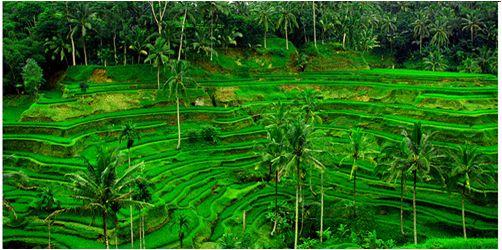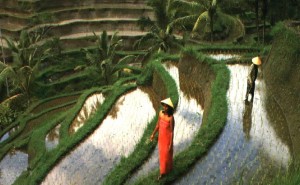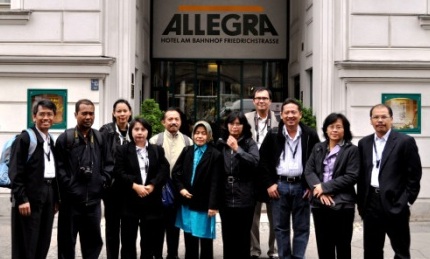Sep
16
2010
 GEN stands for Gadjah Mada University – Indonesia and Ehime University – Japan Network that is U to U collaboration based on a mutual cooperation, as a forum for academics and institutions to share new knowledge and research results on some particular subject or global issues. This year, the 3rd GEN International Seminar was held on August 2010 in Bali, Indonesia. The event is organized by Gadjah Mada University, Ehime University, RISPESCIA (Indonesian Supply Chain Research and Development) and incorporation with some universities, both from Indonesia as well as Japan. The theme of 3rd GEN International Seminar was “Sustainable Bio-resources for Global Welfare”, it provides a forum for representatives from the public, researchers, scientists, professionals and policy makers to join. Furthermore, related topics in the seminar were (a) Forest Carbon Budgeting for REDD, (b) Zeolite Chemistry and Its Industrial Application, (c) Plant Factory, (d) Biodiversity and Natural History Museum, (e) Functional Food, (f) Molecular Genetics of Tropical Rain Forest, (g) Hydrological Issues under Global Warming, and (h) Supply Chain in Practices. The author has presented his research paper titled “Application of Web-based Monitoring System for Plant Growing by Using Machine Vision” that prepared together with Mr. Atris Suyantohadi, Mr. Dody Kastono and Mr. Andri Prima. Special thanks to Faculty of Agricultural Technology UGM for supporting us to participate in the seminar.
GEN stands for Gadjah Mada University – Indonesia and Ehime University – Japan Network that is U to U collaboration based on a mutual cooperation, as a forum for academics and institutions to share new knowledge and research results on some particular subject or global issues. This year, the 3rd GEN International Seminar was held on August 2010 in Bali, Indonesia. The event is organized by Gadjah Mada University, Ehime University, RISPESCIA (Indonesian Supply Chain Research and Development) and incorporation with some universities, both from Indonesia as well as Japan. The theme of 3rd GEN International Seminar was “Sustainable Bio-resources for Global Welfare”, it provides a forum for representatives from the public, researchers, scientists, professionals and policy makers to join. Furthermore, related topics in the seminar were (a) Forest Carbon Budgeting for REDD, (b) Zeolite Chemistry and Its Industrial Application, (c) Plant Factory, (d) Biodiversity and Natural History Museum, (e) Functional Food, (f) Molecular Genetics of Tropical Rain Forest, (g) Hydrological Issues under Global Warming, and (h) Supply Chain in Practices. The author has presented his research paper titled “Application of Web-based Monitoring System for Plant Growing by Using Machine Vision” that prepared together with Mr. Atris Suyantohadi, Mr. Dody Kastono and Mr. Andri Prima. Special thanks to Faculty of Agricultural Technology UGM for supporting us to participate in the seminar.
Sep
16
2010

The Subak farmers’ institutional mandates that limited to only the management of irrigation systems for farming system in Bali should be again considered in line with regional development. “Agro” based integrated development became one of the alternative solutions for strengthening the Subak farmers’ institutional autonomy, namely agroecotourism system development. This model is expected to be used as a means and the media in improving the performance and management capacity building for the subak farmers’ institution. Furthermore, the farmer groups as a “subject of development centre” have very important role in the regional development that based on the “agricultural” sector. Objectives of the study are (i) for empowering and strengthening Subak as farmers institutional system that based on “good governance system”, indicated by the principle of need, effectiveness, efficiency, flexibility, benefits, equity and sustainability, (ii) to improve the farmers institutional performance, that indicated by the ability as “income generating unit”, beside as well as “socio-cultural based farmers’ institution, (iii) to provide feedback for policy makers in local government in relation to regional development strategy.
 The results of this study are expected to have impacts on (1) Sustainable ecotourism, (ii) welfare of the Subak members, and (iii) Subak sustainability and its autonomy. The study is funded by KKP3T Program – Ministry of Agriculture year 2010.
The results of this study are expected to have impacts on (1) Sustainable ecotourism, (ii) welfare of the Subak members, and (iii) Subak sustainability and its autonomy. The study is funded by KKP3T Program – Ministry of Agriculture year 2010.
Sep
15
2010
The German Academic Exchange Service (DAAD), the University of Applied Sciences Osnabrueck (FHOs), the German Rectors’ Conference (HRK), the Centre for Higher Education Development (CHE) in cooperation with the Alexander von Humboldt Foundation (AvH) are jointly organising the International Deans’ Course. This intensive training course is part of the DIES programme (Dialogue on Innovative Higher Education Strategies) which has been jointly coordinated by DAAD and HRK.

The key objective of the course is to bring together a group of about 30 deans, vice-deans, and heads of departments and to prepare them for the challenges of holding a dean’s position in a changing higher education landscape.

Issues such as faculty management, higher education governance, financial management, change management, quality assurance and leadership will be key parts of this course. A soft skills workshop and an exchange with German university leaders about higher education reforms will be included. Part I of this course was held in Osnabrueck and Berlin on June 2010.
 GEN stands for Gadjah Mada University – Indonesia and Ehime University – Japan Network that is U to U collaboration based on a mutual cooperation, as a forum for academics and institutions to share new knowledge and research results on some particular subject or global issues. This year, the 3rd GEN International Seminar was held on August 2010 in Bali, Indonesia. The event is organized by Gadjah Mada University, Ehime University, RISPESCIA (Indonesian Supply Chain Research and Development) and incorporation with some universities, both from Indonesia as well as Japan. The theme of 3rd GEN International Seminar was “Sustainable Bio-resources for Global Welfare”, it provides a forum for representatives from the public, researchers, scientists, professionals and policy makers to join. Furthermore, related topics in the seminar were (a) Forest Carbon Budgeting for REDD, (b) Zeolite Chemistry and Its Industrial Application, (c) Plant Factory, (d) Biodiversity and Natural History Museum, (e) Functional Food, (f) Molecular Genetics of Tropical Rain Forest, (g) Hydrological Issues under Global Warming, and (h) Supply Chain in Practices. The author has presented his research paper titled “Application of Web-based Monitoring System for Plant Growing by Using Machine Vision” that prepared together with Mr. Atris Suyantohadi, Mr. Dody Kastono and Mr. Andri Prima. Special thanks to Faculty of Agricultural Technology UGM for supporting us to participate in the seminar.
GEN stands for Gadjah Mada University – Indonesia and Ehime University – Japan Network that is U to U collaboration based on a mutual cooperation, as a forum for academics and institutions to share new knowledge and research results on some particular subject or global issues. This year, the 3rd GEN International Seminar was held on August 2010 in Bali, Indonesia. The event is organized by Gadjah Mada University, Ehime University, RISPESCIA (Indonesian Supply Chain Research and Development) and incorporation with some universities, both from Indonesia as well as Japan. The theme of 3rd GEN International Seminar was “Sustainable Bio-resources for Global Welfare”, it provides a forum for representatives from the public, researchers, scientists, professionals and policy makers to join. Furthermore, related topics in the seminar were (a) Forest Carbon Budgeting for REDD, (b) Zeolite Chemistry and Its Industrial Application, (c) Plant Factory, (d) Biodiversity and Natural History Museum, (e) Functional Food, (f) Molecular Genetics of Tropical Rain Forest, (g) Hydrological Issues under Global Warming, and (h) Supply Chain in Practices. The author has presented his research paper titled “Application of Web-based Monitoring System for Plant Growing by Using Machine Vision” that prepared together with Mr. Atris Suyantohadi, Mr. Dody Kastono and Mr. Andri Prima. Special thanks to Faculty of Agricultural Technology UGM for supporting us to participate in the seminar.


